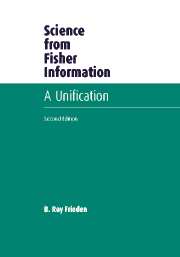Book contents
- Frontmatter
- Contents
- 0 Introduction
- 1 What is Fisher information?
- 2 Fisher information in a vector world
- 3 Extreme physical information
- 4 Derivation of relativistic quantum mechanics
- 5 Classical electrodynamics
- 6 The Einstein field equation of general relativity
- 7 Classical statistical physics
- 8 Power spectral 1 / ƒ noise
- 9 Physical constants and the 1/x probability law
- 10 Constrained-likelihood quantum measurement theory
- 11 Research topics
- 12 EPI and entangled realities: the EPR–Bohm experiment
- 13 Econophysics, with Raymond J. Hawkins
- 14 Growth and transport processes
- 15 Cancer growth, with Robert A. Gatenby
- 16 Summing up
- Appendix A Solutions common to entropy and Fisher I-extremization
- Appendix B Cramer–Rao inequalities for vector data
- Appendix C Cramer–Rao inequality for an imaginary parameter
- Appendix D EPI derivations of Schrödinger wave equation, Newtonian mechanics, and classical virial theorem
- Appendix E Factorization of the Klein–Gordon information
- Appendix F Evaluation of certain integrals
- Appendix G Schrödinger wave equation as a non-relativistic limit
- Appendix H Non-uniqueness of potential A for finite boundaries
- Appendix I Four-dimensional normalization
- Appendix J Transfer matrix method
- Appendix K Numerov method
- References
- Index
4 - Derivation of relativistic quantum mechanics
Published online by Cambridge University Press: 03 February 2010
- Frontmatter
- Contents
- 0 Introduction
- 1 What is Fisher information?
- 2 Fisher information in a vector world
- 3 Extreme physical information
- 4 Derivation of relativistic quantum mechanics
- 5 Classical electrodynamics
- 6 The Einstein field equation of general relativity
- 7 Classical statistical physics
- 8 Power spectral 1 / ƒ noise
- 9 Physical constants and the 1/x probability law
- 10 Constrained-likelihood quantum measurement theory
- 11 Research topics
- 12 EPI and entangled realities: the EPR–Bohm experiment
- 13 Econophysics, with Raymond J. Hawkins
- 14 Growth and transport processes
- 15 Cancer growth, with Robert A. Gatenby
- 16 Summing up
- Appendix A Solutions common to entropy and Fisher I-extremization
- Appendix B Cramer–Rao inequalities for vector data
- Appendix C Cramer–Rao inequality for an imaginary parameter
- Appendix D EPI derivations of Schrödinger wave equation, Newtonian mechanics, and classical virial theorem
- Appendix E Factorization of the Klein–Gordon information
- Appendix F Evaluation of certain integrals
- Appendix G Schrödinger wave equation as a non-relativistic limit
- Appendix H Non-uniqueness of potential A for finite boundaries
- Appendix I Four-dimensional normalization
- Appendix J Transfer matrix method
- Appendix K Numerov method
- References
- Index
Summary
Derivation of Klein–Gordon equation
Goals and prior knowledge
The main wave equations of relativistic quantum mechanics are the Klein–Gordon, Dirac, Weyl, and Rarita–Schwinger equations. The principal aim of this chapter is to derive these, by means of the EPI principles (3.16) and (3.18). The derivations generally follow Frieden (1995), or Frieden and Soffer (1995), with numerous additions.
In addition, the Schrödinger wave equation (SWE), which is non-relativistic, is also to be derived. Since rigorous use of EPI gives only relativistic wave equations (Chapter 3), EPI can only derive the SWE in some approximate sense. This is directly carried through in Appendix D, or by taking the well-known non-relativistic limit of the Klein–Gordon equation in Appendix G.
Also, in Appendix D a simple EPI derivation of classical mechanics is obtained. In particular, in the limit h → 0 the EPI extremum condition (3.16) is found to give Newton's second law, and the zero-condition (3.18) gives the virial theorem, of classical mechanics.
Other derived results are Eq. (4.17) – the equivalence of mass, momentum, and energy; the constancy of the Planck constant h (Sec. 4.1.14); the Compton wavelength as an ultimate resolution length (Sec. 4.1.17); and the Heisenberg uncertainty principle (Sec. 4.3).
It is important to state what is assumed a priori. The relativistic properties of space and time coordinates were derived in Sec. 3.5. Hence, these are assumed here. Also, appropriate units for the concepts of mass and energy are assumed to be known, although the basic relation Eq. (4.17) between them is not presumed.
Information
- Type
- Chapter
- Information
- Science from Fisher InformationA Unification, pp. 131 - 162Publisher: Cambridge University PressPrint publication year: 2004
